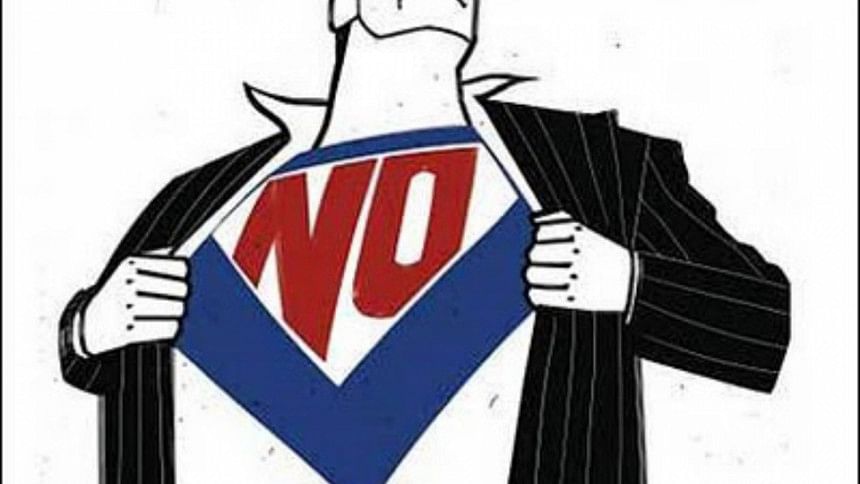Power of NO

During my insensitive, immature childhood years I used to be hugely amused when a few of my South Asian friends from the South of India would shake their heads from left to right, saying Yes. The fun doubled when they nodded their heads and said No. As years went by, I tried understanding whether their approvals and disapprovals had double meanings and if they could actually get away from appearing positive yet being negative, and vice versa. Little did I know that in many occasions, a definite YES would turn to a NO and that the power of No would continue to soar in the world…
A "No" campaign took place in Chile. After fifteen years of military dictatorship and increasing international pressure, the government of Chile asked the public to vote in the national plebiscite of 1988 on whether General Augusto Pinochet should continue to be their leader for another eight years or whether there would be a new President the next year. The "No" campaign gained momentum with 27 nights of television advertisements and finally Pinochet was ousted.
A Russian Foreign Minister for the longest time possible, Andrei Gromyko was known as Mr. Nyet as he vetoed the most as the UN ambassador. Known as Mr. Grim Grom, nobody saw him smile, ever, and needless to say he was one Foreign Minister who was skillful and a professional practitioner of the diplomatic trade. And what he did mostly was say 'No.'
Three mornings away, while the Greeks went to vote, I laughed the loudest when one of my friends, completely disconnected from the world of economics, commented how Greece had acted like many of our rich businessmen, and in the process, overspent and defaulted. In an extra serious tone, she also recollected how her father used to remind her to safely put away money for the next day's expenses before spending the day's budget. So much for regular wisdom… What however continued to bug her was the fact that Greece was a great destination to visit and a great "free" land for tourists. Little did she know that in spite of the failure to repay €1.6 billion to IMF, and in spite of what the nation had gone through, good hotels were still expensive and they were all demanding cash. However, the ground reality, which was seriously dismal, did touch her. Her face fell as I told her about the reports on scenes of panic in northern Greece where pensioners had reportedly fainted outside banks in Salonika. The picture of a week-old panic outside banks, supermarkets and petrol stations touched her even faster. The news of pensioners, waiting outside closed banks in Salonika, and collapsing when it became obvious that the lenders weren't going to open shop and they would not be getting their monthly allowances, made her cringe even more. However, later that evening, what ended up mattering most to me was the victory of NO. Pushed by the final "take-it-or-leave-it" proposal by Greece's creditors — the EU, the European Central Bank and the IMF, 10 million Greeks chose to vote NO in the decisive referendum on July 5, 2015. Turns out that the Greeks didn't quite believe that ticking the Oxi (No) box meant a Grexit from the Eurozone and little did they understand that while the public coffers were empty, this referendum meant an approximate cost of €100 million, just to test Greece's standing in Europe, and not so much about a non-existing proposal that has already expired. So Greece, this minute as per IMF Managing Director, Christine Lagarde, is in arrears straight away…
And all this happened as Alexis Tsipras led the charismatic NO campaign aided and inspired by his ever charming (recently ex) Finance Minister Yanis Varoufakis, who while leaving his formal shirts untucked, riding town on a Yamaha motorbike, tweeting seriously with more than half a million followers, accused France and Germany of "economic terrorism", described austerity measures as "fiscal waterboarding", called IMF, European Commission and European Central Banks as institutions built on "rotten foundations", and termed the outcome of the referendum as Greece rising against "debt-bondage". And now for Greece, IOUs or "scrip" in place of cash will possibly be its answer while it faces its debts of around €315 billion ($340 billion)—175 percent of its GDP. Yet, the people of Greece had said No to the rest of the European Union.
Saying NO takes a lot of courage and conviction. And for your columnist, NO continues to be an extra special word because of a longstanding historical relationship with the word…
I was often told that women could just sit indoors and enjoy the fruits of the labour that the men in the family would put in. I said No. I was told that giving shares to the girls in the family was a mistake as they would eventually get married and leave their paternal homes. I said No. I was told that a few areas were best left to the men in the family. I said No. For years, saying No has been a rewarding struggle. Every time I said No, an extended phase of discomfort had followed. But at my end, the habit of saying No has continued. Over the years, I have continued saying No to every issue that unsettles my conviction, when gender is looked upon as a utility tool to further equality objectives, when being counted as a female is turned into a data crunching exercise.
As people, as a nation, let's continue to say NO when a YES looks suspicious; let's also say NO when freedom is impinged upon and let's say NO when and how we want to.
The writer is Managing Director, Mohammadi Group.

 For all latest news, follow The Daily Star's Google News channel.
For all latest news, follow The Daily Star's Google News channel. 



Comments